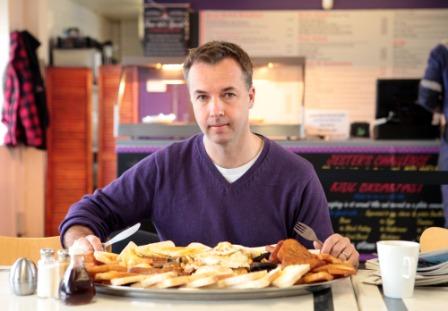If your evening regime involves lying on the sofa with a KFC boneless banquet wedged between your knees and a bucket of Fanta, complete with multi-angled drinking straw to prevent unnecessary movement, under your armpit, then you would have been forgiven for avoiding The Men Who Made Us Fat. Who, after all, wants to spend their downtime being made to feel like a self-harming, NHS-crushing lard-arse? If, however, you subsist on twig tea and a diet of dandelions washed in spring water by tiny winged seraphs, you might have felt compelled to watch, if only to reaffirm your disdain for the junk food addicts troughing themselves into an early grave.
In the event, Jacques Peretti’s three-parter made idiots of us all, whether fat or thin, by ignoring the traditional arguments about tackling obesity (eat less and you’ll weigh less etc) and portraying us not as thinking individuals able to make decisions about what we eat, but as helpless pawns in the business decisions of evil men in suits.
He spent an inordinate amount of time telling us what anyone who shops in supermarkets surely already knows
There was, naturally, compelling evidence to back the claim. With two-thirds of British people overweight and a quarter of us now clinically obese, our collective weight gain over the last 40 years can undoubtedly be mapped in parallel with the shifting practices of food manufacturers. These range from the advent of super-size meals and the widespread use of corn syrup as a sweetener (a third cheaper than sugar and startlingly efficient at metabolising into fat) to the trumpeting of supposedly healthy foods - often the same additive-soaked rubbish but with an extra glob of pureed fruit in it.
This final episode looked at the bogus claims of healthy food producers and laid down the realities of a balanced diet as presented by avaricious supermarket chains. Just because something is organic doesn’t make it less fattening, we were told, as if this were actually news. Indeed Peretti and his bevy of talking heads spent an inordinate amount of time telling us what anyone who shops in supermarkets surely already knows, and doing it over and over again. Healthy food is more expensive! Supermarkets put profit first! Unhealthy food tastes better than healthy food!
 Peretti (pictured right with breakfast) was more informative on the health scares of the past, taking us back to Edwina Currie’s late-Eighties egg calamity, mad cow disease and the marketing campaign masterminded by Sunny Delight to convince parents that their glutinous orange drink was in some way nutritious. The company never quite recovered from the scandal that ensued after a four-year-old drank too much of it and turned the same colour as Jordan.
Peretti (pictured right with breakfast) was more informative on the health scares of the past, taking us back to Edwina Currie’s late-Eighties egg calamity, mad cow disease and the marketing campaign masterminded by Sunny Delight to convince parents that their glutinous orange drink was in some way nutritious. The company never quite recovered from the scandal that ensued after a four-year-old drank too much of it and turned the same colour as Jordan.
But the flaw in this, and indeed the whole series, was in absolving us, the consumers, of all responsibility and in trying to convince us that our overeating was entirely down to "them". While Peretti’s shaming of the food industry was admirable in its ferocity, his determination not to embarrass viewers was baffling and more than a little dishonest.
Of course, you can argue that trends in food production, portion sizes and hidden ingredients are mitigating factors when it comes to modern eating habits and our ever-expanding waistlines. But ultimately, while this stuff looks good in takeaway cartons and on supermarket shelves, no one is forcing us to eat it.















Add comment